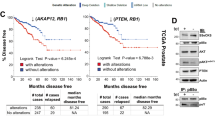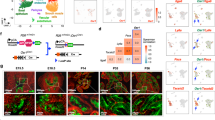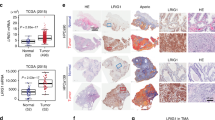Abstract
Mutations in the PTEN tumor suppressor gene are found in a high proportion of human prostate cancers, and in mice, Pten deletion induces high-grade prostate intraepithelial neoplasia (HGPIN). However, progression from HGPIN to invasive cancer occurs slowly, suggesting that tumorigenesis is subject to restraint. We show that Pten deletion, or constitutive activation of the downstream kinase AKT, activates the transforming growth factor (TGF)β pathway in prostate epithelial cells. TGFβ signaling is known to have a tumor suppressive role in many cancer types, and reduced expression of TGFβ receptors correlates with advanced human prostate cancer. We demonstrate that in combination either with loss of Pten or expression of constitutively active AKT1, inactivation of TGFβ signaling by deletion of the TGFβ type II receptor gene relieves a restraint on tumorigenesis. This results in rapid progession to lethal prostate cancer, including metastasis to lymph node and lung. In prostate epithelium, inactivation of TGFβ signaling alone is insufficient to initiate tumorigenesis, but greatly accelerates cancer progression. The activation of TGFβ signaling by Pten loss or AKT activation suggests that the same signaling events that have key roles in tumor initiation also induce the activity of a pathway that restrains disease progression.
This is a preview of subscription content, access via your institution
Access options
Subscribe to this journal
Receive 50 print issues and online access
$259.00 per year
only $5.18 per issue
Buy this article
- Purchase on Springer Link
- Instant access to full article PDF
Prices may be subject to local taxes which are calculated during checkout






Similar content being viewed by others
References
Cairns P, Okami K, Halachmi S, Halachmi N, Esteller M, Herman JG et al. Frequent inactivation of PTEN/MMAC1 in primary prostate cancer. Cancer Res 1997; 57: 4997–5000.
Dahia PL . PTEN, a unique tumor suppressor gene. Endocr Relat Cancer 2000; 7: 115–129.
Suzuki H, Freije D, Nusskern DR, Okami K, Cairns P, Sidransky D et al. Interfocal heterogeneity of PTEN/MMAC1 gene alterations in multiple metastatic prostate cancer tissues. Cancer Res 1998; 58: 204–209.
Wang SI, Parsons R, Ittmann M . Homozygous deletion of the PTEN tumor suppressor gene in a subset of prostate adenocarcinomas. Clin Cancer Res 1998; 4: 811–815.
Di Cristofano A, Pandolfi PP . The multiple roles of PTEN in tumor suppression. Cell 2000; 100: 387–390.
Yamada KM, Araki M . Tumor suppressor PTEN: modulator of cell signaling, growth, migration and apoptosis. J Cell Sci 2001; 114 (Part 13): 2375–2382.
Podsypanina K, Ellenson LH, Nemes A, Gu J, Tamura M, Yamada KM et al. Mutation of Pten/Mmac1 in mice causes neoplasia in multiple organ systems. Proc Natl Acad Sci USA 1999; 96: 1563–1568.
Di Cristofano A, Pesce B, Cordon-Cardo C, Pandolfi PP . Pten is essential for embryonic development and tumour suppression. Nat Genet 1998; 19: 348–355.
Ma X, Ziel-van der Made AC, Autar B, van der Korput HA, Vermeij M, van Duijn P et al. Targeted biallelic inactivation of Pten in the mouse prostate leads to prostate cancer accompanied by increased epithelial cell proliferation but not by reduced apoptosis. Cancer Res 2005; 65: 5730–5739.
Suzuki A, Yamaguchi MT, Ohteki T, Sasaki T, Kaisho T, Kimura Y et al. T cell-specific loss of Pten leads to defects in central and peripheral tolerance. Immunity 2001; 14: 523–534.
Trotman LC, Niki M, Dotan ZA, Koutcher JA, Di Cristofano A, Xiao A et al. Pten dose dictates cancer progression in the prostate. PLoS Biol 2003; 1: E59.
Wang S, Gao J, Lei Q, Rozengurt N, Pritchard C, Jiao J et al. Prostate-specific deletion of the murine Pten tumor suppressor gene leads to metastatic prostate cancer. Cancer Cell 2003; 4: 209–221.
Bayascas JR, Leslie NR, Parsons R, Fleming S, Alessi DR . Hypomorphic mutation of PDK1 suppresses tumorigenesis in PTEN(+/−) mice. Curr Biol 2005; 15: 1839–1846.
Chen ML, Xu PZ, Peng XD, Chen WS, Guzman G, Yang X et al. The deficiency of Akt1 is sufficient to suppress tumor development in Pten+/− mice. Genes Dev 2006; 20: 1569–1574.
Majumder PK, Febbo PG, Bikoff R, Berger R, Xue Q, McMahon LM et al. mTOR inhibition reverses Akt-dependent prostate intraepithelial neoplasia through regulation of apoptotic and HIF-1-dependent pathways. Nat Med 2004; 10: 594–601.
Majumder PK, Yeh JJ, George DJ, Febbo PG, Kum J, Xue Q et al. Prostate intraepithelial neoplasia induced by prostate restricted Akt activation: the MPAKT model. Proc Natl Acad Sci USA 2003; 100: 7841–7846.
Heldin C-H, Miyazono K, ten Dijke P . TGF-ß signalling from cell membrane to nucleus through SMAD proteins. Nature 1997; 390: 465–471.
Massagué J . TGFß signal transduction. Annu Rev Biochem 1998; 67: 753–791.
Zhang Y, Derynck R . Regulation of Smad signaling by protein associations and signaling crosstalk. Trends Cell Biol 1999; 9: 274–279.
Massague J, Seoane J, Wotton D . Smad transcription factors. Genes Dev 2005; 19: 2783–2810.
Ikushima H, Miyazono K . TGFbeta signalling: a complex web in cancer progression. Nat Rev Cancer 2010; 10: 415–424.
Massague J, Blain SW, Lo RS . TGFbeta signaling in growth control, cancer, and heritable disorders. Cell 2000; 103: 295–309.
Levy L, Hill CS . Alterations in components of the TGF-beta superfamily signaling pathways in human cancer. Cytokine Growth Factor Rev 2006; 17: 41–58.
Aitchison AA, Veerakumarasivam A, Vias M, Kumar R, Hamdy FC, Neal DE et al. Promoter methylation correlates with reduced Smad4 expression in advanced prostate cancer. Prostate 2008; 68: 661–674.
Zhao H, Shiina H, Greene KL, Li LC, Tanaka Y, Kishi H et al. CpG methylation at promoter site −140 inactivates TGFbeta2 receptor gene in prostate cancer. Cancer 2005; 104: 44–52.
Guo Y, Jacobs SC, Kyprianou N . Down-regulation of protein and mRNA expression for transforming growth factor-beta (TGF-beta1) type I and type II receptors in human prostate cancer. Int J Cancer 1997; 71: 573–579.
Kim IY, Ahn HJ, Zelner DJ, Shaw JW, Lang S, Kato M et al. Loss of expression of transforming growth factor beta type I and type II receptors correlates with tumor grade in human prostate cancer tissues. Clin Cancer Res 1996; 2: 1255–1261.
Williams RH, Stapleton AM, Yang G, Truong LD, Rogers E, Timme TL et al. Reduced levels of transforming growth factor beta receptor type II in human prostate cancer: an immunohistochemical study. Clin Cancer Res 1996; 2: 635–640.
Ding Z, Wu CJ, Chu GC, Xiao Y, Ho D, Zhang J et al. SMAD4-dependent barrier constrains prostate cancer growth and metastatic progression. Nature 2011; 470: 269–273.
Ding Z, Wu CJ, Jaskelioff M, Ivanova E, Kost-Alimova M, Protopopov A et al. Telomerase reactivation following telomere dysfunction yields murine prostate tumors with bone metastases. Cell 2012; 148: 896–907.
Chytil A, Magnuson MA, Wright CV, Moses HL . Conditional inactivation of the TGF-beta type II receptor using Cre:Lox. Genesis 2002; 32: 73–75.
Wu X, Wu J, Huang J, Powell WC, Zhang J, Matusik RJ et al. Generation of a prostate epithelial cell-specific Cre transgenic mouse model for tissue-specific gene ablation. Mech Dev 2001; 101: 61–69.
Debes JD, Tindall DJ . Mechanisms of androgen-refractory prostate cancer. N Engl J Med 2004; 351: 1488–1490.
Majumder PK, Grisanzio C, O'Connell F, Barry M, Brito JM, Xu Q et al. A prostatic intraepithelial neoplasia-dependent p27 Kip1 checkpoint induces senescence and inhibits cell proliferation and cancer progression. Cancer Cell 2008; 14: 146–155.
Di Cristofano A, De Acetis M, Koff A, Cordon-Cardo C, Pandolfi PP . Pten and p27KIP1 cooperate in prostate cancer tumor suppression in the mouse. Nat Genet 2001; 27: 222–224.
Kim J, Roh M, Doubinskaia I, Algarroba GN, Eltoum IE, Abdulkadir SA . A mouse model of heterogeneous, c-MYC-initiated prostate cancer with loss of Pten and p53. Oncogene 2012; 31: 322–332.
Sorrentino A, Thakur N, Grimsby S, Marcusson A, von Bulow V, Schuster N et al. The type I TGF-beta receptor engages TRAF6 to activate TAK1 in a receptor kinase-independent manner. Nat Cell Biol 2008; 10: 1199–1207.
Yamaguchi K, Shirakabe K, Shibuya H, Irie K, Oishi I, Ueno N et al. Identification of a member of the MAPKKK family as a potential mediator of TGF-beta signal transduction. Science 1995; 270: 2008–2011.
Truett GE, Heeger P, Mynatt RL, Truett AA, Walker JA, Warman ML . Preparation of PCR-quality mouse genomic DNA with hot sodium hydroxide and tris (HotSHOT). Biotechniques 2000; 29: 52–54.
Bartholin L, Melhuish TA, Powers SE, Goddard-Leon S, Treilleux I, Sutherland AE et al. Maternal Tgif is required for vascularization of the embryonic placenta. Dev Biol 2008; 319: 285–297.
Galgano MT, Conaway M, Spencer AM, Paschal BM, Frierson HF Jr. . PRK1 distribution in normal tissues and carcinomas: overexpression and activation in ovarian serous carcinoma. Hum Pathol 2009; 40: 1434–1440.
Powers SE, Taniguchi K, Yen W, Melhuish TA, Shen J, Walsh CA et al. Tgif1 and Tgif2 regulate Nodal signaling and are required for gastrulation. Development 2010; 137: 249–259.
Acknowledgements
We thank Sharon Birdsall and Marya Brown for technical assistance, Doug DeSimone for use of the Zeiss microscope, Anindya Dutta and Dan Gioeli for helpful discussions and Tiffany Melhuish for expert advice and assistance. This work was supported by a Program Project Grant from the National Cancer Institute (2P01CA104106 to B Paschal and D Wotton), and by a pilot grant from the UVA Cancer Center (funded from the CCSG P30 CA44579, the James and Rebecca Craig Foundation, and UVA Women’s Oncology fund) to D Wotton.
Author information
Authors and Affiliations
Corresponding author
Ethics declarations
Competing interests
The authors declare no conflict of interest.
Rights and permissions
About this article
Cite this article
Bjerke, G., Yang, CS., Frierson, H. et al. Activation of Akt signaling in prostate induces a TGFβ-mediated restraint on cancer progression and metastasis. Oncogene 33, 3660–3667 (2014). https://doi.org/10.1038/onc.2013.342
Received:
Revised:
Accepted:
Published:
Issue Date:
DOI: https://doi.org/10.1038/onc.2013.342
Keywords
This article is cited by
-
Contextual determinants of TGFβ action in development, immunity and cancer
Nature Reviews Molecular Cell Biology (2018)
-
Genetic and Molecular Analyses indicate independent effects of TGIFs on Nodal and Gli3 in neural tube patterning
European Journal of Human Genetics (2017)
-
Down-regulation of β-arrestin2 promotes tumour invasion and indicates poor prognosis of hepatocellular carcinoma
Scientific Reports (2016)
-
TGF-β1 pathway affects the protein expression of many signaling pathways, markers of liver cancer stem cells, cytokeratins, and TERT in liver cancer HepG2 cells
Tumor Biology (2016)
-
The novel miR-9500 regulates the proliferation and migration of human lung cancer cells by targeting Akt1
Cell Death & Differentiation (2014)



